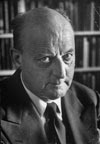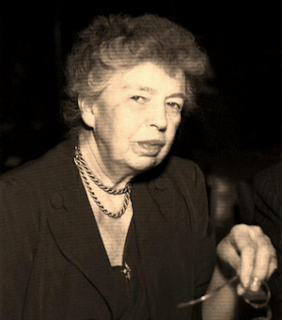As often happens around this blog (I wish we all shared an office), somebody prompts someone else to think about a post. Tim Lacy has helped me do this yet again. He asked me what I knew about Niebuhr and anti-Catholicism. What follows is one insight into that query.
In the summer of 1949, Reinhold Niebuhr had had enough of Catholic cries of “intolerance” and “bigotry.” His Democratic ally and fellow ADA member, Eleanor Roosevelt, had provoked a testy fight with New York City’s imperious Francis Cardinal Spellman over a bill before Congress that would extend federal funds to pupils in America’s public schools. Spellman denounced the bill as “anti-Catholic” for failing to give equal aid to children who attended parochial schools. Spellman contended that if the nation paid for school children to have a “bottle of milk” then all school children should get such aid, not merely those in public schools. On June 23, 1949, Eleanor Roosevelt shot back in her newspaper column “My Day”: “The controversy brought about by the request made by Cardinal Spellman that Catholic schools should share in federal aid funds forces upon the citizens of the country the kind of decision that is going to be very difficult to make.” Ominous words from the “First Citizen of the World.” And such a remark belied a whole set of assumptions that Roosevelt was apparently unable to detect. For his part, Niebuhr wrote in the August 8, 1949 issue of Christianity and Crisis: “If a Roman Catholic cardinal regards an honest difference of conviction between himself and Mrs. Roosevelt on provisions of the education bill as proof of ‘anti-Catholic prejudice’ on Mrs. Roosevelt’s part, it would appear that there is no possibility of proving oneself free of ‘prejudice’ except by agreeing with him.”
To say the least, Niebuhr shared with Roosevelt a “problem” with what they determined was Catholic pride. Daniel Rice explains in an essay from the terrific volume, Reinhold Niebuhr Revisited: Engagements with an American Original (2009), that Niebuhr “viewed the church’s identification with the kingdom of God as the essence of Catholic heresy…Given that the Catholic Church can brook no criticism, Niebuhr labeled Catholicism ‘an officially intolerant religion,’ confessing that it is ‘not easy to deal charitably’ with an institution making the kind of claims it makes.” (326) Revisiting this controversy, even briefly, helps me consider the centrality of competing moral authorities in American religion history—a theme developed in great detail in David Sehat’s book on American religious freedom. As my students and I work our way through a course on the Catholic Church in America, we run into these episodes in which both sides (though often represented most clearly by elite Protestants) assume that they are defending an American legal principle in the face of forces that threaten the sanctity of the separation of Church and State.
Ironically, Niebuhr emulates this pattern in a statement that I am pretty certain he meant as a debate-stopper in his piece on the Roosevelt-Spellman feud. “One further point must be considered in weighing the charge of ‘bigotry’ made by those who disagree with the Catholic position on any question,” Niebuhr lectured. “Have our Catholic friends ever thought how much patience is required when our own convictions are constantly challenged as obvious violations of the natural law, and as, therefore, in conflict with the expressed will of God?” Ouch!
No doubt Niebuhr believed toleration of Catholic schools and the instruction of children therein was a magnanimous feat. However, for a thinker so concerned with power and the dangerous pretentious of confidence in one’s righteousness, Niebuhr might have considered not whether his “Catholic friends” should be sensitive about how their dogmas had been received by others, but what options there were for those friends. Was there some other way to prove one’s fealty to American pragmatism than to agree with the liberal thinkers of the moment? To say that Spellman saw himself as God’s representative on earth is to take things a bit too far—he was the Church’s man in America and America was a nation that commanded a great deal of devotion. While Niebuhr questioned Catholic claims for natural law, there were a few Catholics who occasionally questioned the American (often Protestant-based) claims for the American Way of Life. This dispute over the mythological beast of Church-State separation in the summer of 1949 appears to illustrate this most fundamental clash.




2 Thoughts on this Post
S-USIH Comment Policy
We ask that those who participate in the discussions generated in the Comments section do so with the same decorum as they would in any other academic setting or context. Since the USIH bloggers write under our real names, we would prefer that our commenters also identify themselves by their real name. As our primary goal is to stimulate and engage in fruitful and productive discussion, ad hominem attacks (personal or professional), unnecessary insults, and/or mean-spiritedness have no place in the USIH Blog’s Comments section. Therefore, we reserve the right to remove any comments that contain any of the above and/or are not intended to further the discussion of the topic of the post. We welcome suggestions for corrections to any of our posts. As the official blog of the Society of US Intellectual History, we hope to foster a diverse community of scholars and readers who engage with one another in discussions of US intellectual history, broadly understood.
I meant to respond to Ray’s post via another of my own on Thursday, one dealing primarily with *The Children of Light and the Children of Darkness*. But I dropped the ball. So I’ll aim for next week—which is probably better since I’m about 20 pages away from finishing *Children*. As a teaser, I’ll be picking up on a thought from Alan Wolfe offered in this review of John Patrick Diggins’ last book, *Why Niebuhr Now?* (Chicago, 2011).
Clarification: The thought I’ll be picking up is in the third-from-last paragraph of the review, where Wolfe mentions “Protestant triumphalism.”